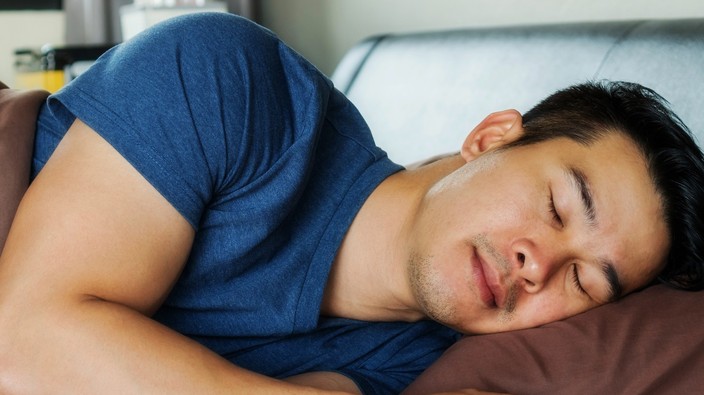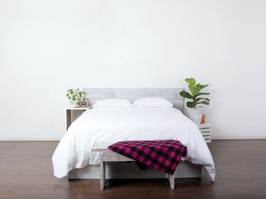opinion: rethinking pills and the insomnia epidemic
immediately turning to sleeping pills is not the answer if you're experiencing poor sleep amid the covid-19 pandemic

try improving your sleep hygiene before trying medication.
getty
if the health impacts of covid-19 weren’t already enough, you can now add a quietly brewing insomnia epidemic to the daily disruptions the pandemic has brought to our lives.immediately turning to sleeping pills, however, is not the right answer. a recent international assessment of sleep disturbances during the pandemic found a greater than 20 per cent increase in sleeping pill usage, highlighting not only increased insomnia but also a reliance on easily accessible therapy. sleeping pills come with their own host of side effects: dependence, memory loss and unsteadiness, and therefore cannot be taken lightly.some have adapted and found ways to develop a healthy routine, whether it be waking up early to see the sunrise or going for a jog. others – especially younger people – have been unable to escape the isolation, such that days start to become like nights and nights like days. waking up minutes before class or work is now possible with little consequence; you no longer have to face others in person. work-from-home means many are also working more hours, leading to a phenomenon called “revenge bedtime procrastination.” after finishing work late, there is a tendency to procrastinate sleep in favour of spending passive time on things like tv or social media.
-avoid taking extensive naps or sleeping in, as these activities may make that night’s sleep more challenging.
-try to use the bedroom solely for rest and intimacy to avoid associations with work or other waking activities.getting ready for bed:-avoid large meals right before bed
-avoid nicotine, recreational drugs, caffeine, and alcohol – if smoking is a must, try not to do so within 4-6 hours of bedtime.
-minimize screen time by removing electronic devices such as tvs, computers, and smart phones from the bedroom. -if you must be near a phone, try placing it outside of arm’s reach from the bed, perhaps on a nearby shelf.bedtime:-ensure your bedroom is quiet and comfortable – try to invest in a good mattress and pillow. use eye masks and earplugs if you live in a loud environment. blackout curtains can be helpful when living in a busy city.
-try to keep a routine where you go to bed and get up at the same time each day. your body can learn a pattern in as little as 1 week.
-avoid watching the clock as you try to sleep as this can reinforce sleep anxiety.
-if you cannot fall asleep within 20 minutes, get up and try to do something calming until you feel sleepy.healthy debate thanks sachin r. pendharkar for his review of this article.yousuf ahmed is a third-year medical student at the university of toronto perpetually excited about health-care innovation.anser daud is a third-year medical student at the university of toronto who is passionate about human rights, health advocacy, and patient education.peter c. zhang is a combined-degree pharmacy and mba student at the leslie dan faculty of pharmacy and the rotman school of management at the university of toronto.this story was originally published on healthy debate. find the original story here.
sleep hygiene
it’s not just streaming before bed: it’s binge eating at night, excessive time on social media, more frequent alcohol use or even long naps during the day. poor sleep hygiene and even more so, poor sleep habits, are undoubtedly worse for health and overall function.for most people without underlying causes of insomnia, lifestyle modifications to improve sleep hygiene and cognitive behavioural therapies are the first-line approach. it may be helpful to define a specific workspace outside your bedroom and create structured start and stop times for work, much like one would have if working at an office. this can help you establish a consistent sleep regimen, to improve not just the quantity of sleep but also the quality.while lifestyle modifications are helpful ways to combat sleep cycle disturbance, in some instances, these specific modifications may not be an option. take, for example, front-line healthcare workers or shift workers who are working extended hours to provide much-needed care to those who need it. humans are naturally diurnal and working through the night can seriously impair sleep health and functioning. to help with this, experts recommend trying a short nap before a night shift and exposure to natural daylight the following day. furthermore, the inability to eat meals at routine intervals or consuming substances that may interfere with sleep such as coffee, tea, and colas often contribute to impaired sleep health. sleep environment is another such contributor, where daytime noise and disruptions, not having a cool and dark environment prevent one’s ability to obtain quality sleep.medication for insomnia and poor sleep
for some patients, pharmacological measures can be beneficial in obtaining immediate relief. despite their demonstrated effectiveness, most agents are not intended for long-term use. in particular, benzodiazepines and other hypnotic drugs such as zopiclone and zolpidem, are known for the risk of dependency and withdrawal effects, especially at higher doses. for this reason, they are often prescribed for a length of therapy of 1 to 2 weeks.withdrawal symptoms such as anxiety, agitation, and rebound insomnia can prevent patients from weaning off these medications. patients may find themselves taking them for months to years and becoming regularly exposed to side effects such as impaired coordination, memory loss, drowsiness, and general cognitive impairments. this is especially alarming for elderly patients who become more susceptible to falls and fractures.these prescription medications are also dangerous with misuse. a severe overdose of benzodiazepines and hypnotics can lead to excessive sedation, coma, and death. additionally, the risk for overdose is significantly increased in the presence of alcohol, which should never be consumed when taking these medications concurrently.over-the-counter medications such as diphenhydramine and melatonin are also sometimes relied upon for relief to varying effects. however, patients should never self-medicate. for individuals suffering from insomnia, they should always speak to their physician or pharmacist first. sleeping difficulties may indicate an underlying pathology and concerning symptoms that may necessitate expert health-care advice from sleep specialists.as insomnia becomes more prevalent, novel therapies continue to emerge, providing patients more options for treatment. one relatively new agent, lemborexant, may be safer for long-term use as clinical trials suggest an absence of dependency and withdrawal effects. although its mechanism of action differs from benzodiazepines and hypnotics, patients taking this drug should also avoid concurrent alcohol consumption and be aware of side effects such as headache and drowsiness.poor sleep can take a toll on your mental well-being. as such, having a support system can be quite beneficial in recognizing and addressing negative thought-processes or even providing you with an outlet to release stress. take the time to check in with your colleagues and family members – sometimes having someone to talk to might just be what you need.10 tips to improving sleep hygiene
daytime:-40 minutes or more of sweat-inducing exercise during the day can help you get more restful sleep. however, try to avoid intensive exercises in the evenings.-avoid taking extensive naps or sleeping in, as these activities may make that night’s sleep more challenging.
-try to use the bedroom solely for rest and intimacy to avoid associations with work or other waking activities.getting ready for bed:-avoid large meals right before bed
-avoid nicotine, recreational drugs, caffeine, and alcohol – if smoking is a must, try not to do so within 4-6 hours of bedtime.
-minimize screen time by removing electronic devices such as tvs, computers, and smart phones from the bedroom. -if you must be near a phone, try placing it outside of arm’s reach from the bed, perhaps on a nearby shelf.bedtime:-ensure your bedroom is quiet and comfortable – try to invest in a good mattress and pillow. use eye masks and earplugs if you live in a loud environment. blackout curtains can be helpful when living in a busy city.
-try to keep a routine where you go to bed and get up at the same time each day. your body can learn a pattern in as little as 1 week.
-avoid watching the clock as you try to sleep as this can reinforce sleep anxiety.
-if you cannot fall asleep within 20 minutes, get up and try to do something calming until you feel sleepy.healthy debate thanks sachin r. pendharkar for his review of this article.yousuf ahmed is a third-year medical student at the university of toronto perpetually excited about health-care innovation.anser daud is a third-year medical student at the university of toronto who is passionate about human rights, health advocacy, and patient education.peter c. zhang is a combined-degree pharmacy and mba student at the leslie dan faculty of pharmacy and the rotman school of management at the university of toronto.this story was originally published on healthy debate. find the original story here.
 5 minute read
5 minute read





